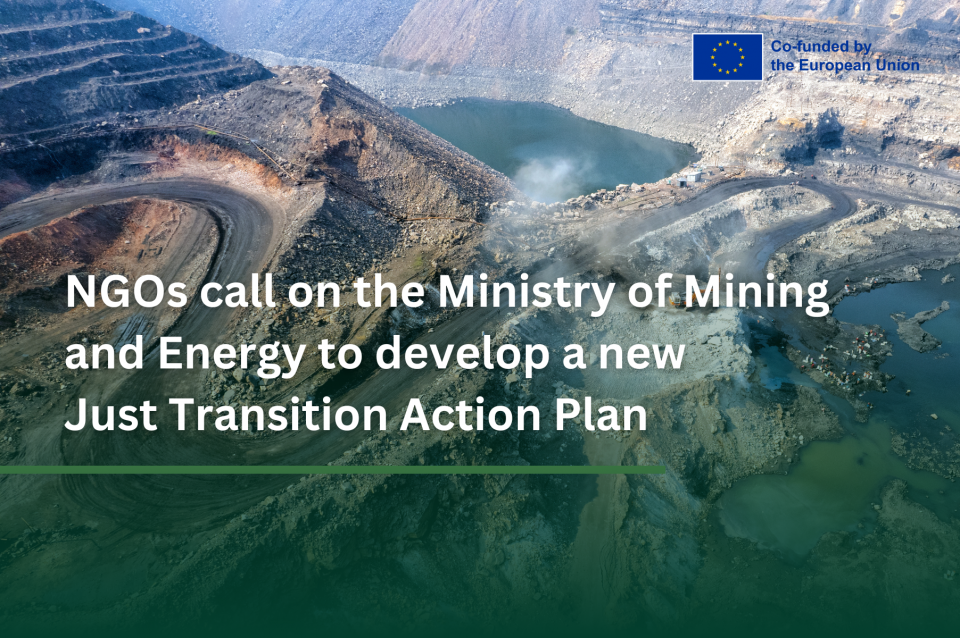Belgrade, June 9, 2025 – At a time when activities to reduce coal dependency and strengthen local communities' capacities to address the challenges of energy transition should already be well underway, the Ministry of Mining and Energy is organizing a public debate on the draft Just Transition Action Plan. In this draft, the public is informed that the energy transition will be “postponed” until 2030, and the proposed measures are limited to “preparatory” activities aimed at “preventing the negative consequences of the energy transition.” Civil society organizations call for the development of a new draft that includes concrete measures and activities for a just transition.
The energy transition has the potential to bring about new opportunities for comprehensive development, but it can also result in devastating consequences if implemented haphazardly and without a plan. The purpose of drafting a Just Transition Action Plan should be to find a collective response to mitigate the consequences of job losses, ensure timely retraining of workers, and diversify income sources in cities and municipalities that depend on coal production. The Renewables and Environmental Regulatory Institute (RERI) and the Belgrade Open School (BOS), supported by 16 organizations, believe that the proposed draft Action Plan fails to meet these needs and highlight the following shortcomings:
1. Public Engagement is Neglected
The Reform Agenda of the Republic of Serbia, adopted without a public debate, envisages the adoption of an action plan that will define measures to implement the just energy transition process. However, the Action Plan presented to the public fails to address these issues and does not include adequate measures for developing new skills, creating new jobs, and supporting new economic sectors in affected regions.
Public participation continues to be reduced to the legally mandated minimum. The Ministry of Mining and Energy allocated only 20 days for the public debate, which is insufficient. Only one public presentation, held in Belgrade, is not enough. It is especially concerning that no presentations are planned in Lazarevac, Obrenovac, Kostolac, Požarevac, or other towns whose residents will be most directly affected.
At the last meeting of the working group tasked with developing the “Just Transition Diagnostic” document, it was stated that the Action Plan would be adopted without public participation. In response, civil society organizations decided to withdraw from the working group and called on the Ministry to open the drafting process to the public.
2. Lack of Legal Basis
The legal basis cited for adopting the Just Transition Action Plan is Article 8a of the Energy Law, which refers to the adoption of the Integrated National Energy and Climate Plan (INECP), even though this document is not and cannot be a part of the Action Plan. If the Ministry intended to amend the INECP, the entire document would have to undergo public consultation. Without a valid legal foundation, the Ministry has unjustifiably excluded the application of the Law on the Planning System.
3. Measures are Vague and Merely “Preparatory”
The Action Plan includes a total of 15 measures to be implemented at both the national and local levels. Most of these measures are either preparatory or involve further analysis and research. The reallocation of the workforce within companies that are part of the coal-based energy production value chain cannot be considered a sustainable transition measure. On the contrary, it risks prolonging coal dependency. By excluding the application of the Planning System Law, the Ministry of Mining and Energy has relieved itself of the obligation to conduct a comprehensive situation analysis, which should have served as the foundation for defining essential measures and activities in the Action Plan.
4. Half a Million Euros for “Updating” Recently Adopted Ministry Documents
The Action Plan proposes the “updating” of legislation and the inclusion of the just transition concept in national strategies, for which the Ministry estimates a budget of half a million euros. However, the Ministry does not specify which exact strategies, laws, and bylaws need to be amended.
Is it the Energy Development Strategy, adopted in November 2024, that needs to be changed? During the public debate on that strategy, the Ministry rejected comments related to the just energy transition, stating that the issue would be addressed in the Just Transition Action Plan. Given that the Ministry has managed to determine the exact amount needed for the legislative “update,” it can be assumed that it has a specific list of regulations to be amended — yet the Plan does not mention them.
5. No Clear Date for Ending Coal-Based Electricity Production
The Action Plan contains numerous vague and conditional formulations, which a document of this type should not include. These point to actions being dependent on uncertain future developments. Apart from general statements that thermal power plants negatively affect the environment and human health, the Plan does not define a phase-out date for coal-based electricity production. As a result, affected communities and workers are unable to make informed and rational decisions.
There are no clear timelines or measures regarding the decommissioning of the Kolubara and Morava thermal power plants, which have been operating unlawfully for over two years — indicating that their closure is not planned before 2030.
Civil society organizations call on the Ministry to restart the process of drafting the Action Plan from the beginning, in accordance with the standards set by the Law on the Planning System and the Energy Community guidelines for just transition planning. We also call on the European Bank for Reconstruction and Development (EBRD) to review the development and adoption process of this document against its environmental and social safeguard standards. The adoption of yet another document lacking concrete measures and a clearly defined sequence of actions will not improve the position of workers in Serbia's energy sector, nor will it ensure a fair energy transition.
Contacts:
Hristina Vojvodić, hristina.vojvodic@reri.org.rs, +381 63 197 1513
Lazar Jovčić, lazar.jovcic@bos.rs, +381 60 680 7014
Signatories:
1. Belgrade Open School, Belgrade
2. Center for Research of Public Policies, Belgrade
3. Center for Environmental Improvement, Belgrade
4. Center for Green Policies, Belgrade
5. Society of Young Researchers, Bor
6. Energy Cooperative “Sunny Roofs,” Perlez
7. BFPE Foundation for a Responsible Society, Belgrade
8. Civic Turnaround, Zrenjanin
9. Ministry of Space, Belgrade
10. Network for Democratic Dialogue
11. Regulatory Institute for Renewable Energy and Environment, Belgrade
12. World Wide Fund for Nature – WWF Adria
13. iRevolucija Association, Valjevo
14. Kraljevo Development Center Association, Kraljevo
15. Local Response Association, Valjevo
16. New Path Association, Kraljevo
17. Pro.Tok21 Association, Smederevo
18. Tim42 Association, Leskovac
This activity was implemented with the financial support of the European Union as part of the Green Agenda Navigator project. The content of the statement is the sole responsibility of Belgrade Open School and do not necessarily reflect the views of the European Union.The Green Agenda Navigator project is being implemented by the Belgrade Open School in cooperation with six regional partners: the Aarhus Centre Association in Bosnia and Herzegovina, Eco-Team from Montenegro, Eco-Z from Kosovo*, the Center for Environmental Research and Information Eko-Svest from North Macedonia, the Protection and Preservation of Natural Environment organization from Albania, and CEE Bankwatch Network as the EU-based partner.

 381 60 30 65 800
381 60 30 65 800






